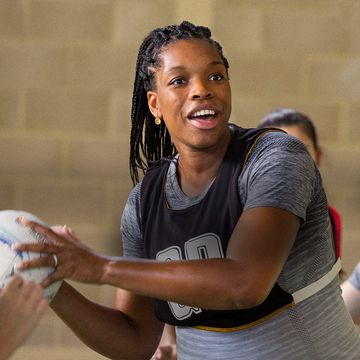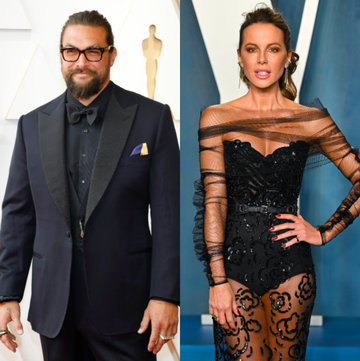I’m 10 minutes into my personal training session with Olympic cyclist Victoria Pendleton when I realise I’ve heard nothing she’s said. The problem is, I can’t stop staring at her. It’s like looking at a living, breathing Leonardo da Vinci sketch of the human body. A beautiful work of art in motion.
Through her black sports leggings, I can see the sinews of her amazing leg muscles outlined, as if drawn by soft grey pencil. Her tiny waist and taut tummy are defined by faintly visible muscles, rippling gently as she moves. Queen Vic, as she has been called, could be telling me to do 4,000 squats wearing a furry tutu for all I know, because I can’t concentrate on what she’s saying with the spellbinding distraction of this superhero in action. Were you to take me to a human body shop and show me the female range on offer, I would point at Pendleton’s and say: ‘I want that one.’ Not because she is slim – that’s not the point here – but because she is strong.
Indeed, even her handshake is firm, her goodbye hug solid. She looks like she could survive anything, tackle anyone, win everything with that body. It’s a physique made for success, one that fuels mental and emotional confidence. And this body, she tells me later, has been created by the most powerful muscle of all: the mind.
This is what I find most intriguing and captivating about Victoria Pendleton, CBE. I want to know exactly what turns a sportswoman into an Olympian. How do you make yourself better than the best? What mantras drive you past demons and negative voices to unbeatable success? That’s what inspires me about the super-smart Pendleton, a double gold and silver Olympic medallist. She is one of Britain’s most successful ever female athletes, having held nine cycling world titles, including a record six in the individual sprint competition. So when I was offered time to train with her at a Fitness First gym, for whom she is an ambassador, I couldn’t resist saying yes. Unlocking the secrets of an Olympic mindset could be useful in every area of life.
Pendleton retired from competitive sport after the London 2012 Olympics and, now 34, she plans to become a personal trainer in between a variety of other projects. Although I’m quite fit, running three or four times a week, I was filled with nervous doubt before my session. ‘Crikey,’ I thought, ‘she’s going to take one look at my four-times-pregnant, caffeine-fuelled, booze-tainted, 46-year-old body and have some stern words about lack of motivation.’ My Editor-in-Chief voice was saying: ‘I love a challenge, bring it on’; my inner voice was saying: ‘Failure awaits.’
But I needn’t have worried. My time with the likeable and down-to-earth VP left me educated and inspired. She shook away negativity and showed me how to fuel the mind with a winning attitude. And it was fun. From here on, I will refer you to what I call the Pendleton Olympic Mindset Lessons.
FAILURE IS GOOD
‘You have to be willing to fail,’ Pendleton explains. ‘Failure is about growth. In the past, I had a huge fear of failure; now I see it differently. Failure gives you the chance to learn how to do it better next time. Having a strong growth mindset is key.’
In short: if you don’t get it right immediately, keep trying and build on experience, because you will get there. ‘You have to look at the fear factor like most men do,’ says Victoria. ‘They don’t care so much about not being 100% competent – they just get on with it. Quite often, if women don’t do something competently the first time, they lose confidence. But repetition and practice will get you to competence, you just have to go through the embarrassing bit first. Accept that, and it’s fun. There is no shame in trying. I try to get rid of concerns about failure – they don’t matter when you’re enjoying what you do. And with exercise, no matter how little, how much or how well you do it, you always feel great afterwards. Focus on that.’
This is a mindset that, I realise later, I often apply to work. Forget the possibility of failing and have a go. Once you’ve stopped worrying about what other people think and imagining about the worst possible outcomes, it’s easy to step into the moment and get on with the task in front of you.
‘STRONG’ IS YOUR WORD OF THE DAY
Don’t chase faster or smaller: chase stronger. This is probably the best lesson I learnt from Pendleton. Of course I want to look good. But, actually, I want to feel good more. This epiphany is applicable to other areas in life, too.
‘With exercise, I’ve found what women actually want to be is stronger, not thinner,’ Pendleton explains. ‘I really enjoy feeling more capable. If you have never accessed the potential power of a stronger you, you’re missing out. When you go to the gym and push yourself a little more than usual, you will leave feeling satisfied and rewarded. More confident. It’s about putting yourself out there, relishing the challenge.
‘About a third of my training as an elite athlete was about developing power and strength, and a large part of my internal confidence today stems from my experiences of being strong.’
Personally, the more often I try something, at work or the gym, the stronger I feel the next time I do it. It’s about having a go and, as you build mental and physical strength, it always gets easier to achieve more.
PAIN IS PART OF THE PROCESS
Pendleton points out that training – and other challenges – can sometimes be uncomfortable or even painful. Accepting this contributes to eventual success. I ask her about the infamous exercise ‘wall of pain’, when everything seems impossible.
‘I know the benefits of hard work, so I’ve come to enjoy that bit of exercising,’ she says. ‘Bodies don’t change if you ask them nicely. If you want to develop and gain strength or endurance, or lose fat, change what you have or just feel better, you have to push through the pain barrier. It is what I call “grateful pain”. Understand it is part of the process to get where you want to be. Yes, it hurts, but you have to carry on.’
This attitude is also helpful in life. It’s the same as acknowledging that not everyone will like you at work; that there will always be a problem or indeed crisis to deal with in your career. Success isn’t easy. There will be difficult challenges – expect them and tackle them, don’t avoid them.
Pendleton adds: ‘I sometimes train with ultra-marathon runners and they tell themselves: “I am going to run the next mile better than the last one.” It’s about being patient and understanding the power of your mind when you tell yourself something positive. But you also you have to accept that some days you will be a bit defeatist. Understanding the ebb and flow of these feelings without feeling guilty is important. It is OK to have a bad day and still be proud of yourself.’ Amen to that.
MAKE ‘WELL DONE YOU’ A NEW MANTRA
I notice that throughout our training (which involves kettlebell exercises, planks, lunges, many squats and Pilates-style stretching, all with gentle but jolly coaxing from the Olympian) that Pendleton uses this phrase with me, and also when she describes how she talks herself through her own extreme fitness regime. Talking up the positives is a simple but effective way of getting things done well.
‘With exercise, it is not about saying: “I should have, I could have.” It’s about looking at the place you’re in at that moment, especially on less successful days, and thinking: “I did it anyway.” Think about where you are, not where you want to be. You have to base the results of each session on exactly how you feel and those specific circumstances – you may not have slept well, for example, or be about to get a cold or something, but you still went out and accepted the challenge. You need to say: “Good job! That was hard, but I made it through. I’m proud.” People can be very black and white about their results, but other shades do exist.’
I spent an hour in the gym with Pendleton, relishing her gently persuasive manner and childlike love of exercising. It was like playing on the climbing frame with a happy but rebellious school friend. Not at all like the more punishing way I normally approach exercise. It was about getting stronger and solving problems in the most positive way possible. She will no doubt be an excellent personal trainer.
For an elite athlete, Victoria Pendleton is one of the most wistful women I’ve met. I expected the characteristics of a machine to go with that extraordinary body, but the person I met was just as normal as you or I. Just as flawed, just as self-questioning – which makes her phenomenal achievements all the more impressive. On the inside of her right arm, she has tattooed the lyrics of a Smashing Pumpkins song: ‘Today is the greatest day I’ve ever known.’ Say it out loud first thing tomorrow morning.
Fitness First memberships start at £25 per month. For more information, visit fitnessfirst.co.uk












